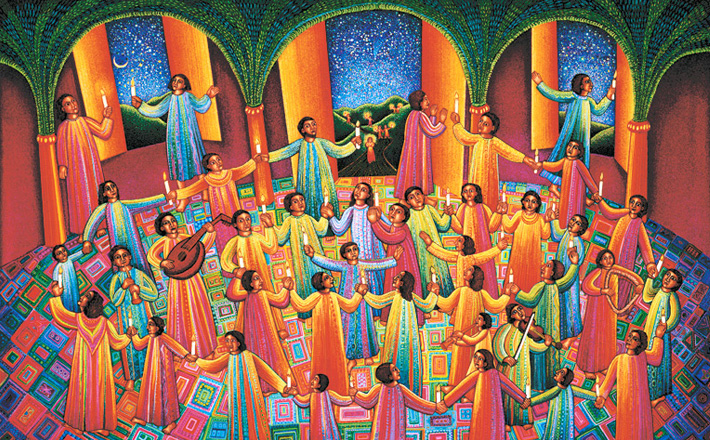Commentary on Psalm 46; Acts 2:37-42
Notes for a four-week preaching series on Sacraments.
The sacraments are sometimes called the “means of grace,” the ways through which God works to promise, to free, to forgive, and to claim people, to make them, to make us, God’s people.
But, if the play on words can be forgiven, how does God use such mean things, to do such great things? And what do these things mean for us?
Over four weeks, two on baptism and two on the Lords’ Supper, worship will be centered around these questions, and these promises; these means.
In what follows I am suggesting another metaphor to help us come to grips with all of these elements of the “means” of grace, and that is the metaphor of “source”; source as origin, and source as place.
Baptism
As often as not (and I am tempted to say too often) when we think about baptism (if we think about baptism at all) we tend to think about what happens in baptism, what baptism does for us. This is, of course, a good thing. But I want to argue that it is equally important to think about what baptism is for us.
It is widely noted that for Martin Luther baptism was to be understood as a daily event, a cleansing and renewal of forgiveness that we need, and is ours, every day. In other words, baptism is not something once done, now finished, but once done, now lived in.
I am taking my lead in this from Psalm 46, which describes a river, “whose streams make glad the city of God” (verse 4). The source (quite literally) of these glad-making waters, feeds a city. The idea is of “place,” of baptism as a metaphorical location in which the baptized finds herself.
In my take on the texts for the first two weeks of this series emphasis has been placed on this sort of take-away from each of the psalms, and from Acts and Romans.
The Lord’s Supper
The Lord’s table, with its supper of bready body and blood-red wine, is a place where we are invited, as the old table-song-summons sings it, “to come and dine, the Master calls us.”
Here again the celebration of the Lord’s Supper creates what is sometimes called “liminal space,” space which God creates using the concrete elements with a word of Promise, in order to meet us, feed us, forgive us, bring us together. And, just as importantly, this space, this place, is where we can encounter the living God — to meet, and know, be transformed by Christ Jesus.
Week 1: Aug. 13, 2017 [Baptism]
Preaching text: Psalm 46; Acts 2:37-42
Psalm 46 begins, before even the source-metaphor of river and city, by describing God as a “refuge,” a place. In this refuge one may find strength and present help, and, watered by streams of joy, gladness. The water imagery, of rivers and streams, is evocative of God’s presence. It is in the city of God where such waters are found, and where God is found, there is God’s city. These are not only obvious, but apt images for an understanding of baptism.
In the Old Testament, the “city of God” is, on the one hand, clearly Jerusalem. But on the other hand, any city, literally any place where God’s name is, is God’s city, God’s place (see Exod 20:24, Jer 7:12; Ps 74:7). And in the book of Revelation there is the promise of a “new Jerusalem” (Rev 21:2), which is a metaphor for the church. And throughout the New Testament, the church is constituted by the baptized. Where the baptized are, there the “city of God” is.
In Acts 2 the emphasis in on calling “all who are far away,” to come to God. While the place imagery is not so obvious here, the notion of movement — from far to near — of a calling to closeness, is. If God’s city is that place where we are made glad in God’s presence, then it is also the place where we find forgiveness, and are given the gift of the spirit (2:38).
Peter, after telling God’s story (Acts 2:14-36), calls his listeners to be baptized “in the name of Jesus Christ.” Thus, the name of Christ, the name of God’s Son, is caused to dwell in the baptized. And where the name of God is, there God is, there the city of God is.
Baptism, here through the lens of Psalm 46 and Acts 2 is not simply something that is done, it is a place; a refuge to which all are called, and re-called; named and re-named.


August 13, 2017